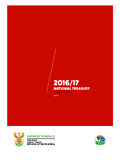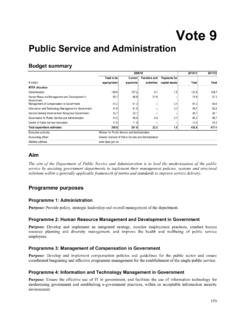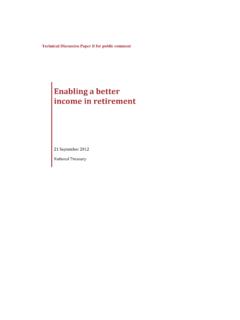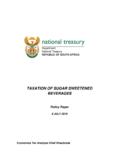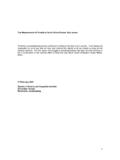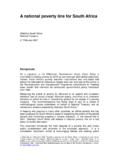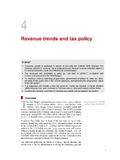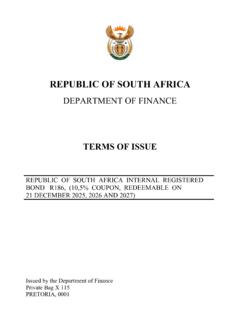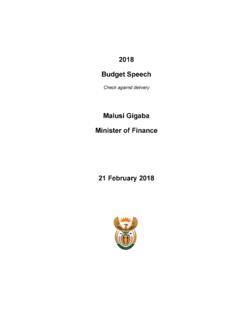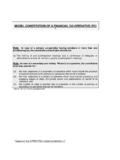Transcription of PPPF REGULATIONS APPROVED - National Treasury
1 PREFERENTIAL PROCUREMENT REGULATIONS , 2001 PERTAINING TO THE PREFERENTIAL PROCUREMENT POLICY FRAMEWORK ACT: NO 5 OF 2000 Contents PART ONE DEFINITIONS AND APPLICATION 1 Definitions 2 Application PART TWO PREFERENCE POINT SYSTEM, EVALUATION OF TENDERS, AWARDING OF TENDERS NOT SCORING HIGHEST POINTS, CANCELLATION AND RE-INVITATION OF TENDERS 3 The 80/20 preference point system 4 The 90/10 preference point system 5 The 80/20 preference point system for the sale and letting of assets 6 The 90/10 preference point system for the sale and letting of assets 7 Stipulation of preference point system to be used 8 Evaluation of tenders on functionality and price 9 Award of contract to tender not scoring the highest number of points 10 Cancellation and re-invitation of tenders PART THREE DUTY TO PLAN.
2 GENERAL CONDITIONS, PRINCIPLES, DECLARATIONS, PENALTIES, TAX CLEARANCES AND TENDER GOALS 11 Duty to plan for invitation of tenders 12 General conditions 13 Principles 14 Declarations 15 Penalties 16 Tax clearance certificate 17 Specific goals 18 Short Title 2 REGULATIONS The Minister of Finance has, in terms of section 5 of the Preferential Procurement Policy Framework Act, 2000 (Act No 5 of 2000), made the REGULATIONS contained in the Schedule.
3 SCHEDULE PART ONE DEFINITIONS AND APPLICATION Definitions 1. In these REGULATIONS , unless the context indicates otherwise, a word or expression to which a meaning has been assigned in the Act bears the same meaning, and- (a) Act means the Preferential Procurement Policy Framework Act, 2000 (Act No 5 of 2000); (b) Agent means a person mandated by another person ( the principal ) to do business for and on behalf of, or to represent in a business transaction, the principal, and thereby acquire rights for the principal against an organ of state and incur obligations binding the principal in favour of an organ of state.
4 (c) Comparative price means the price after the factors of a non-firm price and all unconditional discounts that can be utilised have been taken into consideration; (d) Consortium or Joint Venture means an association of persons for the purpose of combining their expertise, property, capital, efforts, skill and knowledge in an activity for the execution of a contract; (e) Contract means the agreement that results from the acceptance of a tender by an organ of state; (f) Disability means, in respect of a person, a permanent impairment of a physical, intellectual, or sensory function, which results in restricted, or lack of, ability to perform an activity in the manner, or within the range, considered normal for a human being.
5 3 (g) Firm price is the price that is only subject to adjustments in accordance with the actual increase or decrease resulting from the change, imposition, or abolition of customs or excise duty and any other duty, levy, or tax which, in terms of a law or regulation is binding on the contractor and demonstrably has an influence on the price of any supplies, or the rendering costs of any service, for the execution of the contract; (h) Historically Disadvantaged Individual (HDI) means a South African citizen (1) who, due to the apartheid policy that had been in place, had no franchise in National elections prior to the introduction of the Constitution of the Republic of South Africa,1983 (Act No 110 of 1983) or the Constitution of the Republic of South Africa,1993 (Act No 200 of 1993) ( the Interim Constitution ); and / or (2) who is a female.
6 And / or (3) who has a disability: Provided that a person who obtained South African citizenship on or after the coming to effect of the Interim Constitution, is deemed not to be an HDI; (i) Management in relation to an enterprise or business, means an activity inclusive of control and performed on a daily basis, by any person who is a principal executive officer of the company, by whatever name that person may be designated, and whether or not that person is a director; (j) Non-firm prices means all prices other than firm prices; (k) Person includes reference to a juristic person.
7 (l) Rand value means the total estimated value of a contract in Rand denomination which is calculated at the time of tender invitations and includes all applicable taxes and excise duties; 4 (m) Small, Medium and Micro Enterprises (SMMEs) bears the same meaning assigned to this expression in the National Small Business Act, 1996 (Act No102 of 1996); (n) Sub-Contracting means the primary contractor s assigning or leasing or making out work to, or employing, another person to support such primary contractor in the execution of part of a project in terms of the contract; (o) Tender means a written offer or bid in a prescribed or stipulated form in response to an invitation by an organ of state for the provision of services or goods.
8 (p) Trust means the arrangement through which the property of one person is made over or bequeathed to a trustee to administer such property for the benefit of another person; (q) Trustee means any person, including the founder of a trust, to whom property is bequeathed in order for such property to be administered for the benefit of another person. Application 2.(1) Despite anything to the contrary contained in any law, these REGULATIONS apply to organs of state as contemplated in section 1(iii) of the Act.
9 (2) An organ of state contemplated in sub-regulation (1) must, unless the Minister of Finance has directed otherwise, only apply a preferential procurement system which is in accordance with the Act and these REGULATIONS . (3) An organ of state may deviate from the framework contemplated in section 2 of the Act in respect of a pre-determined tariff based professional appointments. 5 PART TWO PREFERENCE POINT SYSTEM, EVALUATION OF TENDERS, AWARDING OF TENDERS NOT SCORING HIGHEST POINTS, CANCELLATION AND RE-INVITATION OF TENDERS The 80/20 preference point system 3.
10 (1) The following formula must be used to calculate the points for price in respect of tenders / procurement with a Rand value equal to, or above R 30 000 and up to a Rand value of R500 000. Organs of state may, however, apply this formula for procurement with a value less than R 30 000, if and when appropriate: PsPtPP= 801minmin Where Ps = Points scored for price of tender under consideration Pt = Rand value of offer tender consideration Pmin = Rand value of lowest acceptable tender (2) A maximum of 20 points may be awarded to a tenderer for being an HDI and / or subcontracting with an HDI and / or achieving any of the specified goals stipulated in regulation 17.
